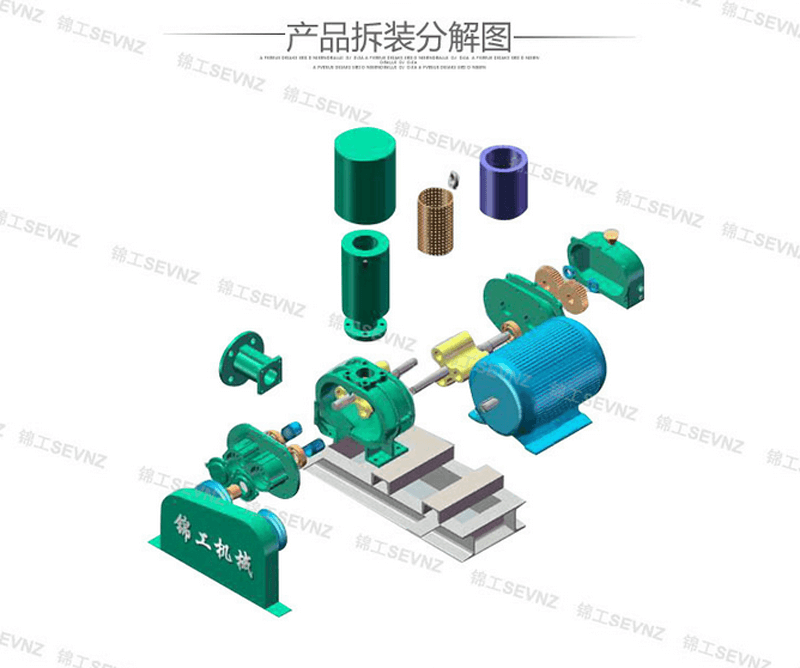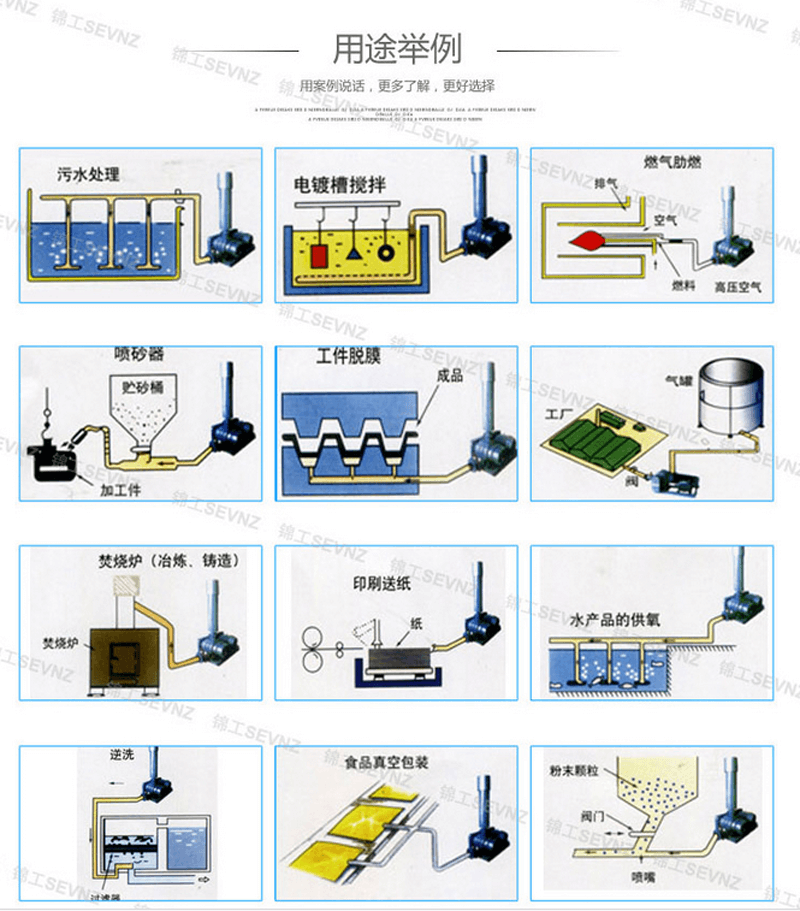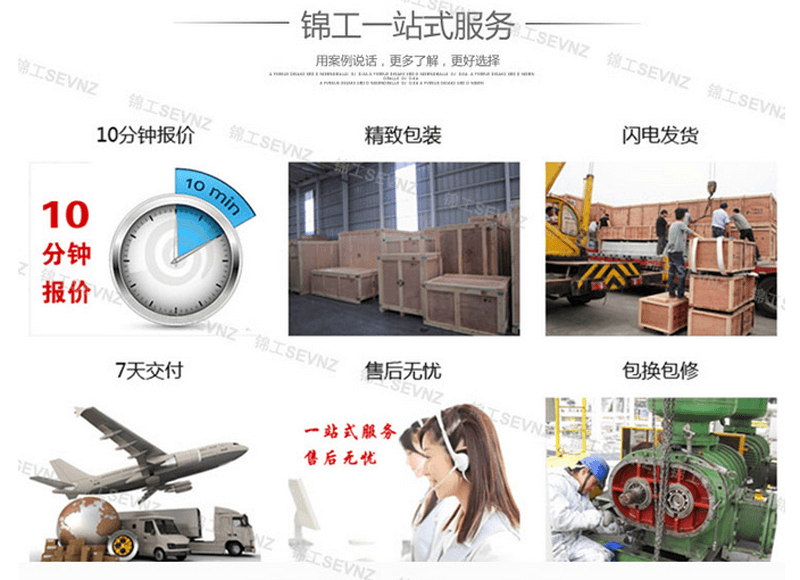
 新聞中心
新聞中心羅茨風(fēng)機(jī)吃帶原因_羅茨風(fēng)機(jī)
羅茨風(fēng)機(jī)吃帶原因:為什么羅茨風(fēng)機(jī)啟動(dòng)時(shí)要放空,什么原因造成的
原標(biāo)題:為什么羅茨風(fēng)機(jī)啟動(dòng)時(shí)要放空,什么原因造成的
羅茨鼓風(fēng)機(jī)是一種高壓鼓風(fēng)機(jī),如果發(fā)動(dòng)機(jī)功率降低,壓力不是特別高,并且在啟動(dòng)時(shí)無需將其排出,只需打開管道閥以保持氣流順暢,為什么要這樣操作呢?羅茨風(fēng)機(jī)啟動(dòng)時(shí)放空的具體的原因小編將在下文作出詳細(xì)的解釋。
如果設(shè)備的工作壓力較高且電動(dòng)機(jī)相對(duì)較大,則可以選擇開始排空并通過減小風(fēng)壓來減小啟動(dòng)電流,從而使電動(dòng)機(jī)啟動(dòng)更平穩(wěn)。當(dāng)設(shè)備正常啟動(dòng)時(shí),可以將其切換到正常使用電路。
如果設(shè)備的工作壓力較高且發(fā)動(dòng)機(jī)比較大,則可以選擇排空啟動(dòng),并通過減小風(fēng)壓來減小啟動(dòng)電流,從而使發(fā)動(dòng)機(jī)啟動(dòng)更加平穩(wěn)。當(dāng)設(shè)備正常啟動(dòng)時(shí),可以將其切換到正常使用電路。
通風(fēng)不暢是相當(dāng)危險(xiǎn)的不當(dāng)操作,羅茨風(fēng)機(jī)具有強(qiáng)制逃生的性質(zhì)。如果沒有通風(fēng),或者通風(fēng)閥僅打開一點(diǎn),出氣量不足,進(jìn)氣量過多,氣體被壓縮到鼓風(fēng)機(jī)轉(zhuǎn)子腔中,鼓風(fēng)機(jī)出口之間的管道和閥門。發(fā)動(dòng)機(jī)轉(zhuǎn)速是固定的,即鼓風(fēng)機(jī)轉(zhuǎn)速是固定的,排氣量保持不變,排氣在管和轉(zhuǎn)子腔中不斷被壓縮,并且壓縮氣體越來越多,這不可避免地需要更多的力量。對(duì)于預(yù)壓縮氣體,風(fēng)扇可以保持相同的速度,因此很容易造成:
發(fā)動(dòng)機(jī)!電動(dòng)機(jī)電壓不會(huì)改變,速度不會(huì)改變,需求會(huì)更大,功也會(huì)更大。電動(dòng)機(jī)功率增加,電流增加,電流過大,保護(hù)程序停止,電動(dòng)機(jī)在沒有保護(hù)程序的情況下燃燒!
羅茨風(fēng)機(jī)暴露于壓縮氣體引起的熱量中,不能立即釋放熱量。風(fēng)扇很熱,變軟并使風(fēng)機(jī)外殼變脆。風(fēng)扇還受到兩個(gè)外力的作用:
1.主軸和風(fēng)扇軸承上的電動(dòng)機(jī)扭矩大。
2.風(fēng)扇殼體上的內(nèi)腔壓出空氣。相互作用力與熱量,爆炸,甚至爆炸的融合也是可能的。這些用戶冒充修理箱的人很多。管道和系統(tǒng)閥原理與上述相同。有許多閥門爆炸,法蘭燒壞。
通過閱讀上面的文章 您現(xiàn)在清楚為什么羅茨風(fēng)機(jī)啟動(dòng)時(shí)要放空了嗎?大家在注意一點(diǎn),羅茨風(fēng)機(jī)停車也是一樣的,打開放空閥,關(guān)閉閘閥,然后關(guān)掉電源。
聲明:文章來源于轉(zhuǎn)載請(qǐng)注明出處!
:

羅茨風(fēng)機(jī)吃帶原因:山東錦工機(jī)械有限公司
羅茨鼓風(fēng)機(jī)在使用過程中會(huì)發(fā)生一定的故障,許多人不知道如何修理,因?yàn)樗惶私猓裉煨∠盗袑懔私馊绾谓鉀Q羅茨鼓風(fēng)機(jī)的縫隙問題。
There will be some faults in the use of Roots blower. Many people don't know how to repair it because they don't know much about it. Today's small series will show you how to solve the gap problem of Roots blower.
談及方式V型皮帶傳動(dòng)。其工作原理是一個(gè)近似橢圓形的具有兩個(gè)面板安全殼成圓筒,葉輪的橫截面時(shí)平行的兩個(gè)長軸線彼此,這是“嚙合點(diǎn)”恰好一半落在轉(zhuǎn)子連接的中心之間。之間的葉輪和壁之間和葉輪與殼體之間的兩個(gè)葉輪,需要保持一定的間隙,策略,以確保風(fēng)扇的操作。如果間隙過大,則氣體壓縮機(jī)是通過間隙增大,風(fēng)扇效率的影響回流;如果間隙過小,由于熱膨脹可能造成影響的風(fēng)力渦輪機(jī)的正常運(yùn)行之間的葉輪和葉輪殼體或相互碰撞。
Talking about V-belt drive. Its working principle is a cylinder with two panels and two parallel long axes in the cross section of impeller, which is exactly half of the "engagement point" falling between the centers of rotor connection. Between the impeller and the wall between the impeller and the shell between the two impeller, need to maintain a certain amount of clearance, strategy, to ensure the operation of the fan. If the clearance is too large, the gas compressor returns through the increase of clearance and the influence of fan efficiency; if the clearance is too small, the impeller and impeller shell or mutual collision between the normal operation of the wind turbine may be affected due to thermal expansion.
由于中國軸承孔在墻板上的位置根據(jù)已定,因此總間隙的數(shù)值是確定的,所謂組織間隙通過調(diào)整,主要是對(duì)節(jié)點(diǎn)上的錐面工作間隙和非錐面間隙可以進(jìn)行合理分配。運(yùn)轉(zhuǎn)時(shí),由于軸的扭轉(zhuǎn)這種變形及齒輪材料磨損等原因,錐面間隙逐漸趨向于一個(gè)縮小,而非錐面間隙開始趨向于風(fēng)險(xiǎn)增大。為保證使用鼓風(fēng)機(jī)以及長期穩(wěn)定可靠安全運(yùn)行,裝配時(shí)可將錐面間隙調(diào)大一點(diǎn),非錐面間隙調(diào)小一點(diǎn)。采用軟齒面齒輪機(jī)構(gòu)傳動(dòng)時(shí),齒輪產(chǎn)生磨損速度較快,一般將錐面間隙取為總間隙的2/3左右,非錐面間隙取為總間隙的1/3左右。當(dāng)齒輪為硬齒面時(shí),齒輪機(jī)械磨損過程很慢,錐面間隙和非錐面間隙可大致分為相等。
Talking about V-belt drive. Its working principle is a cylinder with two panels and two parallel long axes in the cross section of impeller, which is exactly half of the "engagement point" falling between the centers of rotor connection. Between the impeller and the wall between the impeller and the shell between the two impeller, need to maintain a certain amount of clearance, strategy, to ensure the operation of the fan. If the clearance is too large, the gas compressor returns through the increase of clearance and the influence of fan efficiency; if the clearance is too small, the impeller and impeller shell or mutual collision between the normal operation of the wind turbine may be affected due to thermal expansion.
如果發(fā)現(xiàn)葉輪外端與機(jī)殼摩擦,應(yīng)拆下風(fēng)扇齒輪箱蓋,松開風(fēng)扇兩端的螺栓,拆下定位銷。 外徑表頭在傳動(dòng)齒輪和另一端滑輪上分貝。 用銅錘輕輕對(duì)稱地敲擊齒輪和另一端的滑輪。 每個(gè)水龍頭都用計(jì)算尺測(cè)量。 重復(fù),直到間隙滿足,然后對(duì)稱地緊固螺栓兩端的殼體。
If the outer end of the impeller is found to be in friction with the casing, remove the fan gearbox cover, loosen the bolts at both ends of the fan, and remove the locating pin. The outer diameter meter is decibel on the driving gear and pulley at the other end. Tap the gear and the pulley at the other end gently and symmetrically with a copper hammer. Each tap is measured with a slide rule. Repeat until the gap is met, then tighten the housing symmetrically at both ends of the bolt.
如果我們發(fā)現(xiàn)通過葉輪進(jìn)行端面與機(jī)殼側(cè)壁墻板相摩擦,可用使用塞尺檢查檢測(cè)分析葉輪與機(jī)殼側(cè)壁的間隙,將固定設(shè)備軸承蓋螺釘軒出,在靠皮帶輪端的軸承座與軸承蓋間增加或抽取墊紙來調(diào)整,使葉輪作可以軸向方向移動(dòng)。根據(jù)所測(cè)間隙情況而定。效正完畢,再講;螺栓需要依次采用對(duì)稱地旋緊,將軸承蓋固定好。
If we find that the end face of the impeller rubs against the wall plate of the side wall of the casing, we can use feeler gauge to check and analyze the clearance between the impeller and the side wall of the casing, screw out the screws of the bearing cover of the fixed equipment, add or extract the pad paper between the bearing seat and the bearing cover at the pulley end to adjust, so that the impeller can move in the axial direction. It depends on the measured clearance. After the effect is corrected, the bolts shall be tightened symmetrically to fix the bearing cover.
詞標(biāo)簽:羅茨鼓風(fēng)機(jī),羅茨風(fēng)機(jī)
文章

羅茨風(fēng)機(jī)吃帶原因:羅茨風(fēng)機(jī)常見故障原因及處理方法
羅茨風(fēng)機(jī)溫度過高
羅茨風(fēng)機(jī)在使用過程中有時(shí)候會(huì)出現(xiàn)機(jī)殼溫度高的狀況,用手觸摸風(fēng)機(jī)機(jī)殼會(huì)出現(xiàn)燙手,這種現(xiàn)象是屬于非正常現(xiàn)象,具體原因可總結(jié)以下幾點(diǎn):
(1) 風(fēng)機(jī)油箱內(nèi)油太多,太稠,大臟;
(2) 風(fēng)機(jī)過濾器或風(fēng)機(jī)消聲器堵塞;
(3) 風(fēng)機(jī)運(yùn)行壓力高于銘牌規(guī)定值;
(4) 風(fēng)機(jī)葉輪過度磨損造成風(fēng)機(jī)葉輪間隙大;
(5) 風(fēng)機(jī)房通風(fēng)不好,機(jī)房?jī)?nèi)溫度過高,造成風(fēng)機(jī)進(jìn)口溫度高;
針對(duì)以上問題的解決方案如下:
(1) 降低油位或挾油;
(2) 清除風(fēng)機(jī)過濾器或消音器的堵物,定期清理過濾器;
(3) 降低通過鼓風(fēng)機(jī)的壓差;
(4) 修復(fù)風(fēng)機(jī)葉輪間隙;
(5) 風(fēng)機(jī)房開設(shè)通風(fēng)口,或用風(fēng)扇強(qiáng)制通風(fēng),降低室溫;
羅茨風(fēng)機(jī)吃帶原因:羅茨風(fēng)機(jī)曝不起氣的原因是什么?4個(gè)主要原因!錦工風(fēng)機(jī)
羅茨風(fēng)機(jī)在污水曝氣中經(jīng)常使用到,污水曝氣風(fēng)機(jī)在使用過程中可能會(huì)發(fā)現(xiàn)曝氣不足,主要的原因有以下幾點(diǎn):
1、選型錯(cuò)誤
如果選型出現(xiàn)了錯(cuò)誤,壓力不足,沒法實(shí)現(xiàn)曝氣是正常現(xiàn)象,比如我們需要壓力為44.1kpa的羅茨風(fēng)機(jī)進(jìn)行曝氣,選型時(shí)壓力選小了,出現(xiàn)曝氣不足的現(xiàn)象很正常。
2、曝氣盤阻塞
曝氣盤出現(xiàn)了阻塞現(xiàn)象,污水曝氣時(shí),曝氣盤很容易出現(xiàn)阻塞,如果大半數(shù)量的曝氣盤被阻塞,曝氣不明顯,也會(huì)感覺曝不出氣。
3、風(fēng)機(jī)故障
羅茨風(fēng)機(jī)用的越久,風(fēng)機(jī)的各項(xiàng)參數(shù)會(huì)出現(xiàn)問題,比如:風(fēng)量不足、壓力不足等,這些都是正常現(xiàn)象,因?yàn)榱_茨風(fēng)機(jī)在使用過程中會(huì)出現(xiàn)磨損,所以,羅茨風(fēng)機(jī)的參數(shù)用的越久參數(shù)會(huì)出現(xiàn)偏差。
4、管路問題
在使用羅茨風(fēng)機(jī)時(shí),如果出現(xiàn)了羅茨風(fēng)機(jī)的管路問題,如:管道破損泄漏,也會(huì)出現(xiàn)壓力不足的情況;再者,如果曝氣管路過長或者彎管過多,也會(huì)產(chǎn)生壓力損失。
錦工風(fēng)機(jī)專業(yè)生產(chǎn)羅茨鼓風(fēng)機(jī),如果您有此方面的需求,可以聯(lián)系我們的官方客服熱線
:沼氣加壓機(jī)
密集型羅茨鼓風(fēng)機(jī)價(jià)格 羅茨鼓風(fēng)機(jī)效率 高壓羅茨鼓風(fēng)機(jī)價(jià)格
山東錦工有限公司
地址:山東省章丘市經(jīng)濟(jì)開發(fā)區(qū)
電話:0531-83825699
傳真:0531-83211205
24小時(shí)銷售服務(wù)電話:15066131928
- 羅茨風(fēng)機(jī):魚塘羅茨鼓風(fēng)機(jī)安裝視頻
- 羅茨鼓風(fēng)機(jī):魚塘羅茨鼓風(fēng)機(jī)參數(shù)
- 羅茨風(fēng)機(jī):魚塘供氧羅茨鼓風(fēng)機(jī)
- 羅茨鼓風(fēng)機(jī):面粉廠專用羅茨鼓風(fēng)機(jī)
- 羅茨鼓風(fēng)機(jī):青浦壓送型羅茨鼓風(fēng)機(jī)
- 羅茨風(fēng)機(jī):青島羅茨鼓風(fēng)機(jī)廠家供應(yīng)商
- 羅茨風(fēng)機(jī):青島知名羅茨鼓風(fēng)機(jī)
- 羅茨鼓風(fēng)機(jī):青島口碑好的羅茨鼓風(fēng)機(jī)多少錢
- 羅茨風(fēng)機(jī):青島口碑好的羅茨鼓風(fēng)機(jī)
- 羅茨鼓風(fēng)機(jī):陜西羅茨鼓風(fēng)機(jī)
- 羅茨風(fēng)機(jī):陽泉三葉羅茨鼓風(fēng)機(jī)
- 羅茨鼓風(fēng)機(jī):銷售二葉羅茨鼓風(fēng)機(jī)
- 國際風(fēng)能大會(huì)發(fā)布中國制造智能風(fēng)機(jī)
- 新時(shí)期風(fēng)機(jī)企業(yè)的新型工業(yè)化道路
- 我國污水處理市場(chǎng)投資機(jī)會(huì)分析
- 未來幾年風(fēng)機(jī)行業(yè)及關(guān)鍵技術(shù)的發(fā)展趨勢(shì)
- 羅茨風(fēng)機(jī)替代空壓機(jī)促氧化鋁企業(yè)控虧增盈
- 羅茨風(fēng)機(jī)產(chǎn)業(yè)逐步向價(jià)值鏈高端邁進(jìn)
- 羅茨風(fēng)機(jī)行業(yè)競(jìng)爭(zhēng)趨勢(shì)分析
- 人民日?qǐng)?bào):國外小風(fēng)機(jī)產(chǎn)業(yè)對(duì)中國的啟示
- “十三五”時(shí)期國家政策導(dǎo)向和各領(lǐng)域風(fēng)機(jī)需求
- 新時(shí)期風(fēng)機(jī)企業(yè)兩化融合的新型工業(yè)化道路
- 我國污水處理行業(yè)投資機(jī)會(huì)分析
- 未來幾年風(fēng)機(jī)產(chǎn)品和風(fēng)機(jī)關(guān)鍵技術(shù)的發(fā)展趨勢(shì)




